Archives: Documents
-
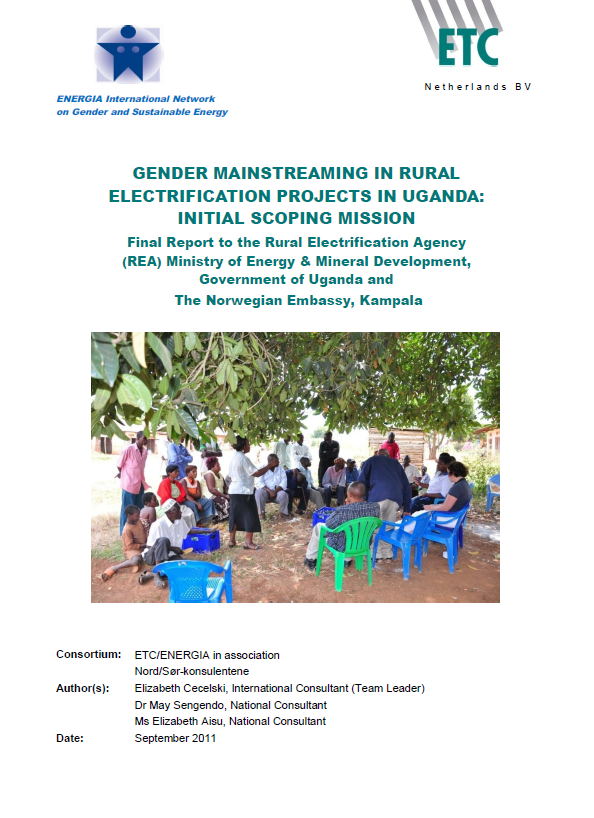
Gender mainstreaming in rural electrification projects in Uganda: Initial scoping Mission
-
Gender mainstreaming in rural electrification projects in Uganda: Initial scoping mission
The Rural Electrification Agency (REA), Ministry of Energy and Mineral Development, is guided by a number of key Ugandan development policy objectives as well as energy policy including a mandate to mainstream gender, with the long-term objective of eliminating gender inequalities. REA has recognized gender concerns in some of its activities, and is seeking to…
-
![Integration du Genre dans le PERACOD, Senegal [in French]](https://energia.org/assets/2020/01/09.-Case_Study_Senegal-Page-1-235x235-1.png)
Integration du Genre dans le PERACOD, Senegal [in French]
Mainstreaming Gender in Energy Projects Knowledge Products In 2007 ENERGIA started with its strategy to mainstream gender in energy projects. We worked with seven energy projects on gender mainstreaming. The projects varied from rural electrification programs to biogas to cook stove projects. Some were household energy projects, others also had a strong focus on energy…
-
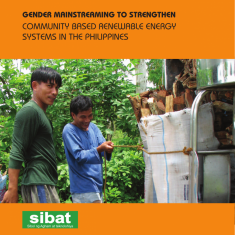
Gender Mainstreaming to Strengthen Community Based Renewable Energy Systems in the Philippines
Mainstreaming Gender in Energy Projects Knowledge Products In 2007 ENERGIA started with its strategy to mainstream gender in energy projects. We worked with seven energy projects on gender mainstreaming. The projects varied from rural electrification programs to biogas to cook stove projects. Some were household energy projects, others also had a strong focus on energy…
-
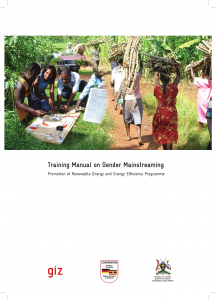
Training Manual on Gender Mainstreaming, Promotion of Renewable Energy and Energy Efficiency Programme
Mainstreaming gender issues within the core business under the Human Rights-based approach (HRB-approach) involves acknowledging that human beings are both, on the one hand, individuals, but also members of particular groups or categories. For that reason, fundamental to gender mainstreaming is the belief that all human beings are entitled to enjoy the basic human right…
-
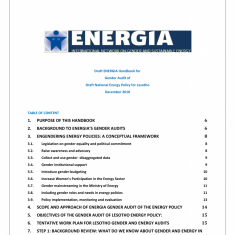
ENERGIA Handbook for Gender Audit of Draft National Energy Policy for Lesotho
This handbook is intended as working guide on “how to” conduct the gender audit for the Lesotho draft National Energy Policy. Its intended users and authors are the national gender audit team and the ENERGIA technical advisor. The handbook provides a process, methods and tools that identifies and analyzes factors that hinder efforts to mainstream…
-
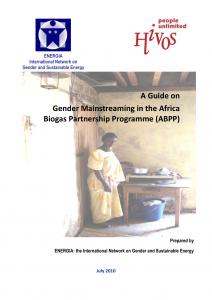
A Guide on Gender Mainstreaming in the Africa Biogas Partnership Programme (ABPP)
This Gender Mainstreaming (GM) Guide has been developed by ENERGIA, the International network on Gender and Sustainable Energy, as preparation for the Workshop on Gender Mainstreaming in ABPP, to be held in Nairobi on 18-19th May, 2010.The draft was discussed at the workshop, and additional inputs incorporated in the final version. The Gender Mainstreaming Guide…
-
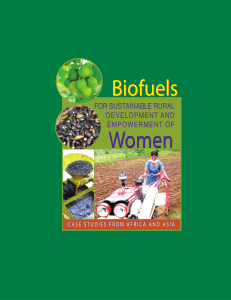
Biofuels for Sustainable Rural Development and Empowerment of Women
This book of case studies represents a collaborative effort to explore the potential of biofuels to provide sustainable livelihoods and local sources of energy for people in rural areas of developing countries, with a special emphasis on women. Although there are many forms of bio-energy that can be useful in this regard, our focus in…
-
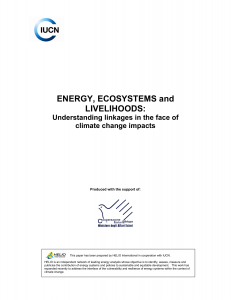
Energy, ecosystems and livelihoods: Understanding linkages in the face of climate change impact
The document begins with a short overview on the impacts of degrading eco-systems on human well-being. How current energy consumption is contributing to this degradation is also addressed. The affect of climate change on ecosystem services and the energy services they provide is then briefly examined. The document concludes with suggestions for how IUCN could…
-
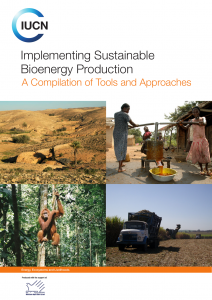
Implementing Sustainable Bioenergy Production: a compilation of tools and approaches
This paper is a compilation of example principles, frameworks and tools already in use in the conservation community which may be applied to bioenergy production to identify and reduce environmental as well as socio-economic -including gender- risks and promote opportunties. The aim is to provide the range of stakeholders who are engaged in the bioenergy…
-
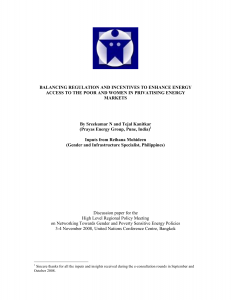
Balancing Regulation and Incentives to Enhance Energy Access to the Poor and Women in Privatising Energy Markets
The objective of this paper is to explore issues related to incentives and regulation in providing energy access to the poor and women. The market oriented reform that began in 1990s, promising the end of all problems of the sector, has by and large bypassed the poor. Many countries have initiated direct programmes to increase…
-
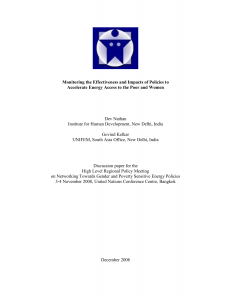
Monitoring the Effectiveness and Impacts of Policies to Accelerate Energy Access to the Poor and Women
The paper develops a framework for monitoring the effectiveness of energy policies with regard to the poor, rural and urban, and women. This framework is based on the axes of Availability, Access, End-use and Impacts. Suitable indicators have been identified for each level of monitoring. With regard to data collection it is suggested that the…

